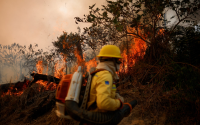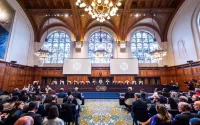Common Dreams / Published on Friday, March 16, 2007 by the Agence France Presse
Environment ministers from 13 major nations agreed Friday to assess the economic cost of Earth's rich biodiversity in a bid to stem species loss and sought common ground in the world's global warming crisis.
 Greenpeace activists hold placards demanding in several languages: 'Stop Talking - Act Now' as they stand stand in the waters of the Jungfernsee near Schloss Cecilienhof in the eastern German city of Potsdam March 16, 2007. The G8 2007 Environment Ministers Meeting hosted by German Environment Minister Sigmar Gabriel takes place at Schloss Cecilienhof March 16 to 17. REUTERS/Arnd Wiegmann (GERMANY) Greenpeace activists hold placards demanding in several languages: 'Stop Talking - Act Now' as they stand stand in the waters of the Jungfernsee near Schloss Cecilienhof in the eastern German city of Potsdam March 16, 2007. The G8 2007 Environment Ministers Meeting hosted by German Environment Minister Sigmar Gabriel takes place at Schloss Cecilienhof March 16 to 17. REUTERS/Arnd Wiegmann (GERMANY) |
The 13 ministers agreed a "Potsdam Initiative" on biodiversity that would seek to calculate the economic costs from dwindling species, said German Environment Minister Sigmar Gabriel, hosting the meeting.
The study would be like the Stern Report on climate change, Gabriel told a press conference, referring to the landmark document issued by British economist Sir Nicholas Stern last year that estimated the economic costs from the effects of global warming.
The 13 countries account for more than two-thirds of the world's carbon emissions, the invisible gases that trap heat from the Sun and threaten havoc with the planet's delicate climate system.
Gabriel said the talks, taking place in "an excellent atmosphere," also sought a way forward on how to cut emissions of greenhouse gases.
"There has been no negotiations," stressed Gabriel, saying the goal was to find common ground ahead of a G8 summit in June in the Baltic resort of Heiligendamm.
Breaching a low-key security ring, Greenpeace activists aboard a sailing vessel and five Zodiac dinghies sailed up the Havel river next to the chateau, and unfurled banners demanding urgent action against global warming by the G8.
Joerg Fedder of Greenpeace Germany came to the chateau entrance where, under police escort, he sought to hand a petition to Gabriel.
Earth's surface temperatures have been steadily rising for the last few decades, driven by the release of billions of tons of carbon gases from burning fossil fuels.
The only worldwide pact for reducing these dangerous emissions is the UN's Kyoto Protocol, which runs out in 2012 but will deliver a cut of only a few percentage points compared with 1990.
That reduction will apply only to industrialized countries, not big developing ones, which do not have binding, targeted pledges under the present format and are now becoming hefty polluters in their own right.
Worse, Kyoto has been virtually crippled by a walkout by the United States, which by itself accounts for nearly a quarter of world pollution.
Negotiations are underway for Kyoto's post-2012 format, but the big challenge is to coax an agreement from Washington and tough commitments from big developing countries, which all fear the economic burden of switching to cleaner, more fuel-efficient technology.
At a summit last week, the 27-nation European Union (EU) pledged to cut its own greenhouse-gas emissions by 20 percent by 2020 and deepen it to 30 percent if "international partners" follow suit.
British Environment Minister David Miliband, whose last week unveiled the most ambitious national legal blueprint for curbing greenhouse gases, said the EU's offer was "a significant attempt to break the logjam."
"I hope there will be some new thinking, some new ideas, some openness, because that is what the G8 plus Five process is designed to contribute," he told reporters.
Meanwhile, the US National Oceanic and Atmospheric Administration (NOAA) reported on Thursday that the Earth had its warmest December-February period since records began 128 years ago.
A record warm January worldwide pushed average temperatures in December-February to 0.72 C (1.3 F) above normal for the 20th century.
In January, the UN'S Intergovernmental Panel on Climate Change (IPCC) pointed to the loss of alpine glaciers and snow cover, retreating permafrost and shifting rainfall patterns as signs that global warming had started to interfere with the climate.
By 2100, global average surface temperatures could rise by between 1.1 and 6.4 C (1.98 and 11.52 F).
The Potsdam meeting ends on Saturday.






